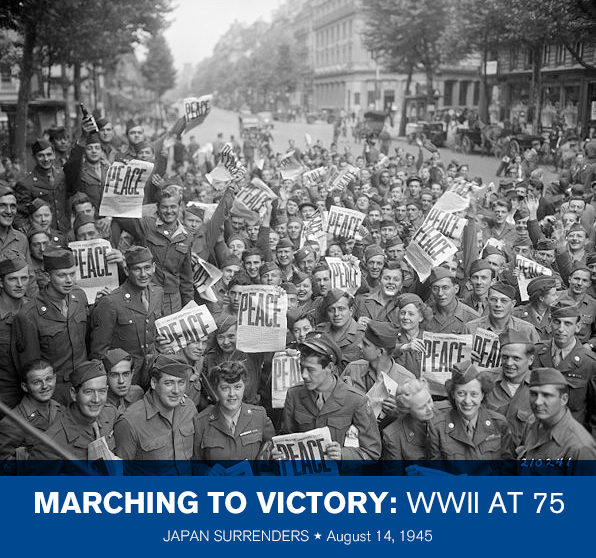WWII 75: Marching to Victory | August 14, 2020

WWII highlights from the Truman Library’s archives and collections
Marching to Victory: Japan Surrenders
President Truman’s News Conference
August 14, 1945
THE PRESIDENT. [reading]: I have received this afternoon a message from the Japanese Government–
Before I go any further, this will be in the form of releases, so you don’t have to copy it unless you want to. “–in reply to the message forwarded to that Government by the Secretary of State on August 11. I deem this reply a full acceptance of the Potsdam Declaration which specifies the unconditional surrender of Japan. In the reply there is no qualification.
“Arrangements are now being made for the signing of the surrender terms at the earliest possible moment.
“General Douglas MacArthur has been appointed the Supreme Allied Commander to receive the Japanese surrender. Great Britain, Russia, and China will be represented by high-ranking officers.
“Meantime, the Allied armed forces have been ordered to suspend offensive action.
“Proclamation of V-J Day must wait upon the formal signing of the surrender terms by Japan.
“The following is the Japanese Government’s message accepting our terms.”
But before I start to read that, there are three releases to come; one has to do with a 2-day holiday.1 The reason we are making it 2 days is because we didn’t get to celebrate for the other. [Laughter] ….
This is the official Swiss communique handed to the Secretary of State:
“Sir: I have the honor to refer to your note of August 11, in which you requested me to transmit to my Government the reply of the Governments of the United States, the United Kingdom, the Union of Soviet Socialist Republics, and China to the message from the Japanese Government which was communicated in my note of August 10.
“At 20.10 today (Swiss Time) the Japanese Minister to Switzerland conveyed the following written statement to the Swiss Government for transmission to the four Allied governments:
“‘Communication of the Japanese Government of August 14, 1945, addressed to the Governments of the United States, Great Britain, the Soviet Union, and China:
“‘With reference to the Japanese Government’s note of August 10 regarding their acceptance of the provisions of the Potsdam declaration and the reply of the Governments of the United States, Great Britain, the Soviet Union, and China sent by American Secretary of State Byrnes under the date of August 11, the Japanese Government have the honor to communicate to the Governments of the four powers as follows:
“‘1. His Majesty the Emperor has issued an Imperial rescript regarding Japan’s acceptance of the provisions of the Potsdam declaration.
“‘2. His Majesty the Emperor is prepared to authorize and ensure the signature of his Government and the Imperial General Headquarters of the necessary terms for carrying out the provisions of the Potsdam declaration. His Majesty is also prepared to issue his commands to all the military, naval, and air authorities of Japan and all the forces under their control wherever located to cease active operations, to surrender arms and to issue such other orders as may be required by the Supreme Commander of the Allied Forces for the execution of the abovementioned terms.’
“Accept, Sir, the renewed assurances of my highest consideration.
“Charge’ d’ Affaires of the Swiss Government in the United States”
Voice: I congratulate you!
THE PRESIDENT. That is all.
Joe Fox, Washington Star: Thank you, Mr. President.
[Applause and further congratulations]NOTE: President Truman’s eighteenth news conference was held in his office at the White House at 7 p.m. on Tuesday, August 14, 1945. The White House Official Reporter noted that members of the Cabinet were present; also the President’s official family, his secretariat, and Administrative Assistants George Schoeneman and David K. Niles. He also noted that former Secretary of State Cordell Hull was invited, but did not arrive until the conference was over.
Provided courtesy of The American Presidency Project. John Woolley and Gerhard Peters. University of California, Santa Barbara.
More to Explore
- Explore Davidson Sommers’ oral history, archived at the Harry S. Truman Library and Museum.
- Relive history in The White House Decision Center. Step back to 1945 and into the roles of President Truman, J. Robert Oppenheimer and other West Wing advisors. How will WWII end? You decide.
Marching to Victory
75 years ago, World War II ended under President Truman’s decisive leadership. Now, follow key events from the war’s final months with the Truman Library Institute’s series, “Marching to Victory: WWII Highlights from the Truman Library’s Archives and Collections.” The 25-part blog series opens the vaults at Truman’s presidential library to share eyewitness accounts and historic artifacts related to major conflicts and monumental victories – from the Battle of the Bulge to the liberation of Dachau to the unconditional surrender of Japan.
More in this series:
Marching to Victory: Iwo Jima
Marching to Victory: The Bombing of Dresden
Marching to Victory: The Yalta Conference
Marching to Victory: The Battle of the Bulge
Marching to Victory: The Tokyo Fire Raids
Marching to Victory: The Battle of Okinawa
Marching to Victory: The Liberation of Buchenwald
Marching to Victory: “The President is Dead”
Marching to Victory: The Liberation of Dachau
Marching to Victory: The Death of Adolf Hitler
Marching to Victory: Germany Surrenders!
Marching to Victory: Victory Gardens
Marching to Victory: Civil Rights
Marching to Victory: The United Nations
Marching to Victory: How Children Helped Win the War
Marching to Victory: The First Atomic Bomb Test
Marching to Victory: The Potsdam Conference
Marching to Victory: The Potsdam Declaration
Marching to Victory: The Bombing of Hiroshima
Marching to Victory: The Bombing of Nagasaki
Join our email list to receive Truman updates right in your inbox:


